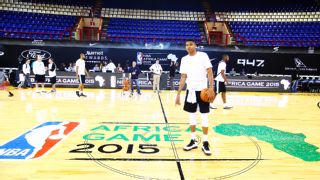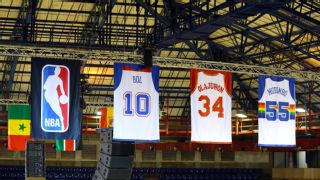There is something to be said about hope: the thoughts and forms it comes in, the places it resides and visits.
In Johannesburg, South Africa, hope will be on display on a continent that is often depicted as hopeless.
"For us it means a lot," said Miami Heat forward Luol Deng in a video interview. "I think for it [to happen] right now is so huge for us. For everybody that is a basketball fan from the continent, it's a huge step forward."
"This game offers young African kids the opportunity to see how far other African kids have been able to take their talent in the best league in the world and against the best in the business." South African sports minister Fikile Mbalula said in an interview prior to the initial press conference opening the NBA Africa Game.
The promise is what this one game has the chance to spark.
Let's deal with what's real: According to The Borgen Project, a nonprofit organization whose initiative is to make global poverty one of the main focuses of U.S. foreign policy, 75 percent of the world's poorest countries are in Africa, 38 percent of the world's refugees are located in Africa and of the people living in sub-Saharan Africa, as many as one third are undernourished and almost 600 million live without electricity.
As Zambian-born author Dambisa Moyo wrote in "Dead Aid: Why Aid is Not Working and How There Is A Better Way For Africa," some "50 percent of the continent remains under non-democratic rule." Since 1996, eleven countries in Africa "have been embroiled in civil wars;" and (according to a 2008 Global Peace Index report) "out of the 10 bottom countries, four African states are among the least peaceful in the world."
And in South Africa specifically, the aftermath of Nelson Mandela's regime and death have left a major part of the country in a place (financially and socially) from which it may be impossible to recover. Unemployment is still high, especially among blacks, and land distribution is still a serious post-apartheid issue, with most farmland remaining white-owned.

Every player playing in this game represents hope. Just as Jackie Robinson and Rube Foster and Satchel Paige represented hope. Just as Jack Johnson and Muhammad Ali represented hope. The extensions of Olajuwon and Dikembe Mutombo continue to do the same.
It is why Cleveland Cavaliers guard Kyrie Irving, on his visit a few years ago with Basketball Without Borders, realized: "Coming over here and being with the kids and seeing their smiles and seeing what we can do to impact the youth here is big."
"To have all these players come home, and not only the African players, but players from all over the globe, it signifies not only unity, but gives the continent a sense of progress," said Toronto Raptors general manager Masai Ujiri, the first African-born GM in U.S. professional sports. "We don't want to be seen as victims. We are a rising continent."
"My hope is that the NBA will spread out basketball better in this continent," said Senegalese native and Minnesota Timberwolves center Gorgui Dieng during a conference call to promote the game. "You know, we get more involved and make basketball bigger and bigger in Africa."
Giving and giving back (which are two totally different things) are not really about money or time. It is about the role one plays in completing the dreams of others, in constructing a path already traveled but less possible than the one already taken. It's about doing whatever one can to make life better for someone besides themselves.
Yes there are global NBA games that will take place over the next few months with the league leaving its imprint everywhere from Milan, Italy, to Shenzhen, China, to Rio de Janeiro, Brazil, but it is in Africa where more than an imprint has to be left.
"With the emergence of African-born players, the NBA's popularity on the African continent has skyrocketed," said Lanre Alabi, a Nigerian-born writer for The Daily Illini and University of Illinois student, via email. "The league isn't solely a new source of entertainment on the continent because taller athletes now see it as a viable option to escaping poverty."
There's Boris Diaw's SEED Project in Senegal, Dieng in Ouagadougou, Burkina Faso, instructing in West African basketball development camps, the example of Hasheem Thabeet's Tanzanian journey out of Dar es Salaam to the NBA and Mutombo's ever-expanding role as public ambassador.
All represent ongoing extensions to the significance the game continually has on being more than just a game on a land that is looking for many different ways to survive and advance.
When asked if he felt this game has the power to change lives, the Oklahoma City Thunder's Serge Ibaka said, "Yes, of course. Change lives, change how people think, change how people see things."
The three-time all-first team NBA defensive power forward from Brazzaville in the Republic of Congo simply said what many of his other "brothers from the land" hope will come from this game.
"I'm pretty sure a lot of people here or other parts of Africa, they've never seen basketball or an NBA game before, this is their first time," Ibaka said. "I think [the NBA Africa Game] is going to change a lot"

The culmination of three decades of African involvement in the NBA finally arrives at a pinnacle. Thirty-five players from Africa have seen their names on the backs of NBA uniforms since Olajuwon entered the league in 1984. One game brings it full circle.
It was South African Archbishop Emeritus Desmond Tutu who reminded us, "We humans can tolerate suffering but we can not tolerate meaninglessness."
The game of basketball has a chance to be something of extreme meaningfulness in Africa and to Africans who will witness their first NBA game played on their soil.
And even though the number of total players who have made it to the NBA from Africa doesn't come close in comparison to, say, the number of Samoans that have played in the NFL or Dominicans in MLB the cultural link between a game and a people doesn't have to be immense to understand the true weight it holds.
We've seen this before. Not with what happened to the rest of the world after it got a glimpse of the original Dream Team, but long before, when the Harlem Rens were changing the lives of black athletes before they were allowed to play in the NBA. When basketball became an escape route.
The eyes of those watching, the eyes of those playing and the eyes of those who have seen what can happen to those who chase their dreams, it will be filled with more than just joy. Sometimes the promise inside of a smile is there to stop someone from crying.
"This game represents a lot," Ibaka said. "For me myself, I've been waiting on this moment for a long time. I feel proud and blessed, you know, to have this here back home and I think for the kids and the young people and for basketball in Africa, I think this is very important for us."
Even nestled in despair, Saturday's game has a chance to portray all the beauty Rokia spoke of in song.
Regardless of what we've been conditioned to believe, hope has no audacity. There's only the audacity of those who fail to understand the power a game like this truly has.
The bounce of a ball. That's all there really is. How it all starts. And from that bounce begins hope.

